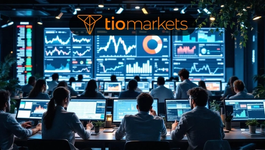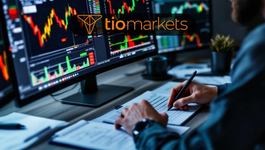World's Largest Stock Exchanges by Market Cap | TIOmarkets
BY TIOmarkets
|June 13, 2024In the dynamic world of finance, stock exchanges play a pivotal role in shaping the global economy. These platforms not only facilitate the buying and selling of stocks but also serve as a barometer for the overall health of the financial markets. Today, we delve into the realm of the world's largest stock exchanges by market capitalization, offering a comprehensive overview that highlights their significance, operations, and the key players that dominate these financial behemoths.
Understanding Market Capitalization
Before we explore the giants of the stock exchange world, it's crucial to grasp the concept of market capitalization. Market capitalization, or market cap, is the total value of a company's outstanding shares of stock. It serves as a metric to gauge a company's size, influence, and stability within the market. This valuation is pivotal in understanding the scale and scope of the stock exchanges that house these corporations.
Calculating Market Cap
Market capitalization is calculated by multiplying the current market price of a company's stock by its total number of outstanding shares. This figure provides investors and analysts with a snapshot of the company's market value, offering insights into its financial health and market position.
Significance of Market Cap
The importance of market capitalization extends beyond mere numbers. It influences investment decisions, company rankings, and the strategic moves of businesses. Larger market caps often indicate more stable investments, attracting a broader base of investors and influencing stock exchange rankings worldwide.
The Titans of Trade
Now, let's shift our focus to the colossal entities that dominate the global financial landscape. The following stock exchanges are renowned not only for their sheer size but also for their impact on global economics, politics, and society.
New York Stock Exchange (NYSE)
At the pinnacle of the financial world sits the New York Stock Exchange, the largest stock exchange by market capitalization. Located in the heart of New York City, the NYSE is a symbol of financial might and prowess, hosting some of the world's most prominent companies.
The NYSE's influence stretches across the globe, setting trends and standards in the financial industry. Its robust platform supports a diverse array of securities, offering unparalleled liquidity and opportunities for investors.
NASDAQ
Renowned for its tech-heavy listing, NASDAQ stands as a beacon for innovation and growth in the stock exchange arena. This electronic exchange has been instrumental in the rise of the technology sector, hosting giants such as Apple, Amazon, and Google's parent company, Alphabet.
NASDAQ's unique model and emphasis on technology have positioned it as a favorite among growth-oriented investors, shaping the future of trading with its cutting-edge platforms and services.
Shanghai Stock Exchange (SSE)
Representing the financial might of the East, the Shanghai Stock Exchange is a testament to China's rapid economic growth and its increasing influence on the global stage. The SSE features a mix of state-owned enterprises and private companies, reflecting the diverse nature of China's economy.
Despite its relatively recent establishment compared to its Western counterparts, the SSE has quickly ascended the ranks to become one of the world's largest stock exchanges by market cap, highlighting the shifting dynamics of global finance.
Key Factors Influencing Market Cap Rankings
The rankings of these financial titans are not static; they fluctuate based on a variety of factors that influence market capitalization. Understanding these elements is crucial for grasping the dynamics of global stock exchanges.
Economic Conditions
Global and national economic conditions play a significant role in shaping the market cap of stock exchanges. Factors such as GDP growth, interest rates, and inflation can significantly impact investor sentiment and stock prices, thereby affecting the overall market capitalization.
Technological Advancements
The advent of technology has revolutionized trading, with electronic exchanges and algorithmic trading becoming increasingly prevalent. Technological advancements can enhance the efficiency and accessibility of stock exchanges, attracting more listings and investors, which in turn boosts market cap.
Regulatory Environment
The regulatory framework governing stock exchanges also influences their market cap. Stringent regulations can ensure transparency and investor protection, enhancing the exchange's reputation and attracting more listings. Conversely, overly restrictive policies may hinder growth and innovation.
Market Cap Fluctuations and Investor Behavior
Market capitalization is not only influenced by external factors but also by investor behavior and market sentiment. The psychology of investors plays a crucial role in determining the valuation of companies and, by extension, the market cap of stock exchanges.
Investor sentiment can be swayed by a myriad of factors, including news events, economic indicators, corporate earnings reports, and geopolitical developments. Positive news may lead to a surge in stock prices, driving market cap higher, while negative news can trigger sell-offs and a decline in market capitalization.
Understanding investor behavior is essential for market participants, as it can provide insights into potential market trends and shifts in sentiment. Analyzing market cap fluctuations in conjunction with investor behavior can offer a comprehensive view of the dynamics at play within stock exchanges.
Globalization and Market Cap Expansion
The process of globalization has had a profound impact on stock exchanges and their market capitalization. As markets become increasingly interconnected, the opportunities for companies to list on multiple exchanges have expanded, leading to a growth in market cap for these platforms.
Globalization has facilitated cross-border investments, allowing investors to diversify their portfolios and access a broader range of opportunities. This interconnectedness has not only boosted market cap for established exchanges but has also paved the way for emerging exchanges to gain prominence on the global stage.
Stock exchanges in emerging markets have seen significant growth in market capitalization, driven by economic development, regulatory reforms, and increased investor interest. As these exchanges continue to mature and attract more listings, their market cap is expected to rise, further diversifying the global financial landscape.
Impact of Mergers and Acquisitions on Market Cap
Mergers and acquisitions (M&A) play a pivotal role in shaping the market cap of stock exchanges. Consolidation within the industry can lead to the creation of larger, more diversified exchanges with increased market capitalization.
When two exchanges merge, their combined market cap often surpasses the sum of their individual values, reflecting the synergies and efficiencies gained through the consolidation. M&A activity can also drive investor interest and confidence, boosting market cap and solidifying the position of the newly formed exchange in the global market.
On the other hand, failed M&A attempts or challenges in integrating merged exchanges can have adverse effects on market cap, leading to uncertainties among investors and stakeholders. The success of M&A transactions in the stock exchange sector is closely monitored for its impact on market capitalization and the overall competitiveness of the industry.
Market Cap and Sectoral Analysis
Examining market capitalization from a sectoral perspective provides valuable insights into the composition and performance of stock exchanges. Different sectors exhibit varying market cap trends based on industry dynamics, economic conditions, and investor preferences.
Technology companies, for example, often command high market capitalization due to their potential for innovation, growth, and disruption. The tech sector's market cap can fluctuate rapidly based on product launches, technological advancements, and shifts in consumer behavior.
On the other hand, traditional sectors such as utilities and consumer staples may have more stable market cap figures, reflecting their defensive nature and consistent performance regardless of market conditions. Analyzing sectoral market cap data can aid investors in identifying trends, opportunities, and risks within specific industries.
Market Cap and ESG Criteria
Environmental, Social, and Governance (ESG) criteria are increasingly influencing market capitalization and investment decisions. Companies that prioritize sustainability, social responsibility, and ethical governance practices are gaining favor among investors, leading to higher market cap valuations.
Stock exchanges that promote ESG principles and offer listings aligned with sustainable criteria are attracting a new wave of investors seeking to align their portfolios with ethical values. The integration of ESG considerations into market cap analysis provides a holistic view of a company's long-term viability and resilience in the face of evolving societal and environmental challenges.
As ESG factors continue to shape investor preferences and regulatory frameworks, market capitalization will increasingly reflect the importance of sustainable business practices and responsible corporate behavior. Stock exchanges that embrace ESG principles are poised to attract capital inflows and enhance their market cap through a commitment to long-term value creation.
Conclusion
The world's largest stock exchanges by market cap are more than just platforms for trading; they are powerhouses that drive economic growth, influence global finance, and shape the future of investment. As these exchanges evolve in response to economic, technological, and regulatory changes, they will continue to play a crucial role in the global financial ecosystem.
At TIOmarkets, we remain committed to providing our clients with insightful analyses and updates on the ever-changing landscape of the financial markets. Stay tuned for more in-depth explorations of the world's leading financial institutions and their impact on global economics.
Start Trading on the World's Largest Markets with TIOmarkets
Ready to take your place in the global financial markets? Join TIOmarkets, a top-rated forex broker, and trade across 300+ instruments in 5 markets, including Forex, indices, stocks, commodities, and futures. With over 170,000 accounts opened in more than 170 countries, we provide traders with low fees and a wealth of educational resources to sharpen your trading skills. Create a Trading Account today and embark on your journey to trade effectively with TIOmarkets.

Risk disclaimer: CFDs are complex instruments and come with a high risk of losing money rapidly due to leverage. You should consider whether you understand how CFDs work and whether you can afford to take the high risk of losing your money. Never deposit more than you are prepared to lose. Professional client’s losses can exceed their deposit. Please see our risk warning policy and seek independent professional advice if you do not fully understand. This information is not directed or intended for distribution to or use by residents of certain countries/jurisdictions including, but not limited to, USA & OFAC. The Company holds the right to alter the aforementioned list of countries at its own discretion.
Join us on social media

Behind every blog post lies the combined experience of the people working at TIOmarkets. We are a team of dedicated industry professionals and financial markets enthusiasts committed to providing you with trading education and financial markets commentary. Our goal is to help empower you with the knowledge you need to trade in the markets effectively.
Related Posts





